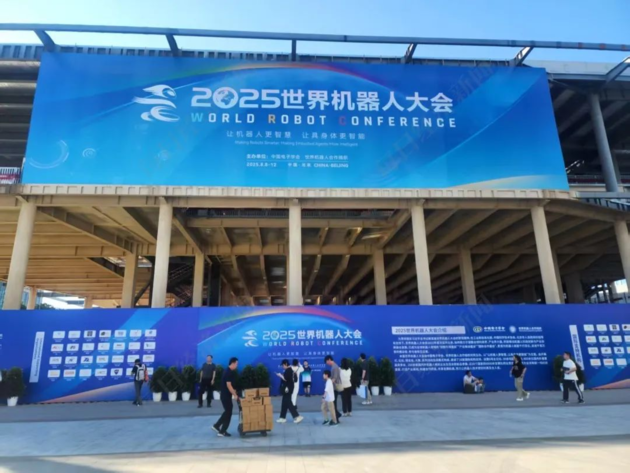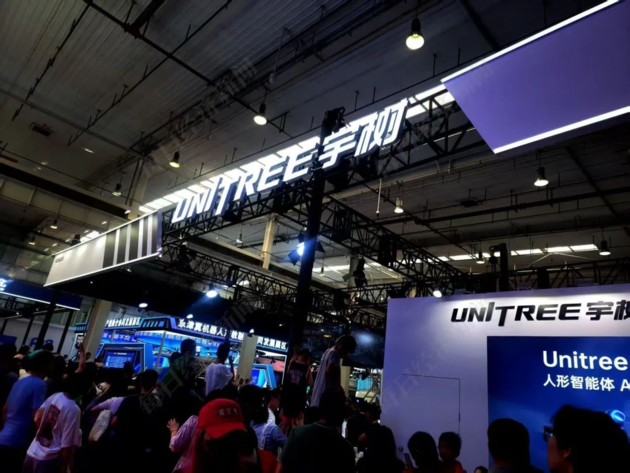At the World Robot Conference 2025, which is being held in Beijing on August 8-12, one booth stood out: Unitree Robotics. Known for high-performance quadruped robots such as the Go2 and B2, the company stole the spotlight again after its humanoid robots starred in Zhang Yimou's CCTV Spring Festival Gala performance YangBot. During the conference, its "robot boxing ring" again drew large crowds.
On August 9, Wang Xingxing, founder and CEO of Unitree, sat down with National Business Daily and other media to discuss the future of humanoid robots, AI capabilities, pricing, and the company's IPO plans.
Wang Xingxing, regarded as a pioneer in China's robotics sector, believes robot prices will keep falling — and once robots can truly "work like humans", public perception will change dramatically. But for humanoids, the hardware is ready while AI models still lag, posing a major bottleneck.
"I treat going public like taking the Gaokao (national college entrance examination)," Wang said. "It's a sign a company has entered a more mature stage of management and operations, and a responsibility to our shareholders."

Photo/Yang Hui (NBD)
A good product is the foundation
NBD: What's Unitree's next strategic priority?
Wang Xingxing: The robotics sector, led by AI, is attracting huge attention. Resources and publicity are abundant, but competition is fierce. For any company — including ours — the essence is to build better products: better performance, better prices, more complete functions, and better after-sales service. That's the foundation.
Whether facing domestic or global competition, you need a solid base. And strategy matters: I always try to anticipate where AI, hardware, manufacturing, and global markets will be in a few years, and prepare in advance.
Robots will get cheaper — and may even be taxed like workers
NBD: Will robots really become cheap — even free — as you’ve suggested?
Wang Xingxing: Prices will definitely drop, no question. Some of our products are already cheaper, though prices vary by model. Lower prices mean more customers, higher adoption, and bigger ecosystems — from rentals to developer communities.
When robots can truly work, society's perception will shift. I even think governments could tax robots at the factory gate — just like taxing a worker's output. Imagine robots reclaiming farmland, with part of their yield going directly to the state. But this requires robots that really perform human-level work.
With fast tech breakthroughs, that could happen in 2–3 years; slower, maybe 5 years — but likely within 10.
AI is still the bottleneck for humanoids
NBD: What tech breakthroughs are still needed?
Wang Xingxing: The biggest issue is embodied AI. Today, AI can write simple code well, but struggles with complex tasks. In robotics, AI capabilities are still insufficient.
The critical moment will be when humanoid robots can walk freely in a venue like this, understand spoken instructions, and actually help with tasks. That's what society expects.

Photo/Yang Hui (NBD)
Hardware is fine — models need to leap forward
NBD: How do we solve the generalization and decision-making gap?
Wang Xingxing: Hardware is usable, but needs to be cheaper and more reliable. The real hurdle is that embodied AI models haven't had their "ChatGPT moment".
Language models improve rapidly with enough data, but in robotics, even large datasets often fail to translate well to real-world robots. We need models that can train well with minimal data and still generalize effectively — not just big datasets on weak models.”
From performance to productivity — still takes time
NBD: Why so many robot performances?
Wang Xingxing: Shows meet public curiosity, and right now it's technically easier than real work. It's like early computers — not immediately useful to everyone, but foundational.
We aim for robots to do real work, but until the tech is ready, performances and sports keep development moving — like smartphone gaming before productivity apps.
Half of revenue comes from overseas
NBD: How's Unitree's global expansion?
Wang Xingxing: Half of our revenue comes from overseas. We started going global in 2018, before it became a buzzword, and we've always seen global markets as critical.
Management improvement important for fast-growing firms
NBD: How do you handle so many product lines?
Wang Xingxing: As our team grows, management becomes more important — otherwise more people could mean less efficiency. We must make each person more productive and keep improving.
Robots Working Is the Future
NBD: Many humanoid robots are still used for performances or entertainment. But expectations go far beyond that. Which application scenarios do you see as most promising?
Wang Xingxing: As I've said, our goal — and really the industry's goal — is for robots to truly work, to free up productivity and improve efficiency.
So why do we see so many performances right now? First, if you walk around an exhibition, you'll notice that the public enjoys shows more — they meet people's curiosity. Second, it's still not very realistic to have intelligent robots doing productive work, except in certain automated equipment or fixed processes in factories — and those cases aren’t really what we mean by embodied intelligence.
My core point is this: our ultimate goal is for robots to work, but while the technology isn't mature, we can focus on performances, competitions, or other applications to keep pushing things forward.
Humanoid shipments doubling annually
NBD: What's the growth trend?
Wang Xingxing: Globally, humanoid shipments are doubling each year. That pace should hold, and if there's a major breakthrough, we could see hundreds of thousands shipped annually within 2~3 years.
IPO as the "Gaokao"
NBD: How will listing help?
Wang Xingxing: We're following the process. I see it like the Gaokao — a milestone showing we've reached a more mature stage, both for the company's development and as an answer to our shareholders.


 川公网安备 51019002001991号
川公网安备 51019002001991号





